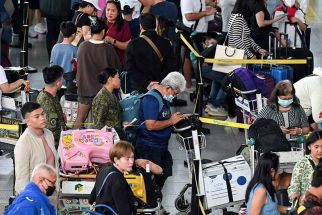Digital booking instead of truck ban proposed
MANILA, Philippines - Asian Terminals Inc. (ATI), operator of the Manila South Harbor and the Port of Batangas, is pushing for an IT vehicle booking system in place of a truck ban in Manila to allow businesses to continue their operations and keep the economy growing.
In a letter to the Philippine Exporters Confederation Inc., ATI executive vice president Andrew Hoad said the proposed system is similar to how airlines book their flight’s departure and arrival to achieve optimal airport efficiency and traffic management.
“It will allow those who book to plan quicker, more cost-effective journeys and at the same time reduce the number of trucks on the road at any given time. There is no need for a truck ban if this system were put in place,†Hoad said.
The proposal will require a central system that will link brokers and consignees. Trucks that come unscheduled will be turned away and fined, he said.
He said the business community, particularly those in the Calabarzon (Cavite-Laguna-Batangas-Rizal-Quezon) region, could help ease congestion in Manila’s ports by using Batangas port.
Batangas port can accommodate at least 300,000 20-foot equivalent units (TEUs), with more than 90 percent of the capacity available.
“We can take in more volume in Batangas,†he said, noting though that it is still not the primary solution to address road congestion in Metro Manila as the two ports serve different markets.
Of the two million TEUs that pass through Manila’s port, some 1.7 million are delivered within a 20-kilometer radius around the metropolis.
As 80 percent of container imports are for consumers, the bulk of the 1.7 million TEUs for Metro Manila would still have to be transported back to the metropolis and add to road traffic even if they are unloaded in Batangas.
“Manila and Batangas are different markets, which both need a gateway with open, accessible roads without truck ban,†Hoad said.
The local government of Manila implemented in February an ordinance prohibiting trucks from using city’s streets from 5 a.m. to 9 p.m. to ease heavy traffic in the city.
Coordinate efforts
Meanwhile, a lawmaker is pushing for coordinated efforts to mitigate the impact of the truck ban in Manila that dragged down economic growth in the first quarter of the year.
Caloocan City Rep. Edgar Erice said the truck ban is creating a dent on the economy.
The National Economic and Development Authority had earlier reported that the expansion of the country’s domestic output as measured by gross domestic product (GDP) slowed down to 5.7 percent in the first three months of the year from 7.7 percent in the first quarter, and 6.7 percent in the fourth quarter of 2013.
Erice pointed out that city councils should not pass ordinances that will affect the welfare of its neighboring cities.
He urged the House committees on local government and on Metro Manila Development to look into ways to resolve the truck ban issue.
“If all cities like Manila would issue a similar ordinance, the result would be the collapse of the Philippine economy,†Erice said.
The lawmaker said the City of Manila should have first exhausted all options to improve traffic and road access “before limiting the flow of the economy.â€
According to him, cargo trucks that traverse Manila streets are vital cogs to the speed of trade, and thus the pace of growth in the economy.
Erice filed House Bill 712 seeking the creation of a special metropolitan political subdivision in the National Capital Region, to be called the Metro Manila Regional Administration, to tackle the gargantuan problems of one of the largest metropolises in the world in terms of population.
He noted that the truck ban ordinance was hastily implemented, disrupting transport of goods and preventing local businesses from abiding by their international shipping contracts.
“Businesses, thus, suffered huge losses risking the employment of thousand of Filipino workers,†he said.
Erice said the increase in cargo trucks in Manila streets is a positive sign that the economy is growing.
“I can’t understand why the focus of the ordinance is the positive factors and not the negative causes of the worsening traffic situation,†he said.
He said monstrous traffic in Manila should be blamed on lack of road access and poor traffic management.
According to him, trucks transporting goods through Manila’s streets are just a small fraction of traffic congestion in the city.
He said the local government of Manila can explore other options in easing the flow of vehicles in the city such as clearing the R10 Road that stretches from Tondo to Caloocan City; removal of obstructions such as street vendors, uncoordinated road repairs, and dismantling of the junk shops that sprouted along R10.
He said several open areas along R10 could be used as parking spaces for trucks.
Credit Suisse economic Michael Wan earlier said the implementation of a truck ban in Manila prompted factories to cut their outputs, putting at risk the government’s seven percent GDP growth target.
“If we are right about these two drivers, production and export activities will likely remain subdued in 2Q, and perhaps beyond,†Wan said. – With Lawrence Agcaoili
- Latest
- Trending

































